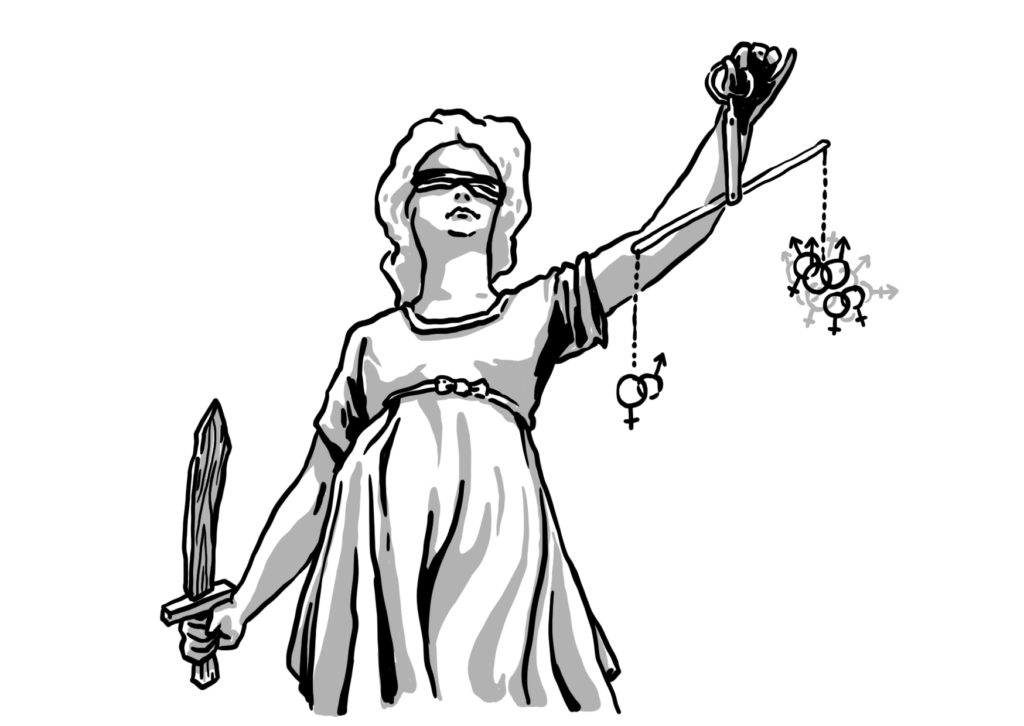The German General Equal Treatment Act (Allgemeines Gleichbehandlungsgesetz), which was enacted in 2006 and prohibits discrimination on the grounds of race, sex, sexual orientation, age, religion or belief and disability, transposes four pieces of EU equality legislation into German law. In 2016, Germany’s national equality body, the Federal Anti-Discrimination Agency (Antidiskriminierungsstelle des Bundes), responsible for overseeing the implementation of the Act, commissioned an independent evaluation and is now calling upon the Federal Government to legislate for reform. Executive Editor Lisa Gow discussed the desired reforms and the outlook for discrimination in Germany with the head of the agency, Christine Lüders.
Last year, you and the German Federal Anti-Discrimination Agency (FADA) celebrated the 10th anniversary of the General Equal Treatment Act. However, in comparison to many other EU Member States, the FADA has far fewer resources and competences at its disposal to legally enforce the rights protected by the Act. What consequences does this have for human rights protection in Germany?
First of all, ten years of legal protection against discrimination in Germany is a reason for celebration. Back then, prohibiting discrimination plainly and simply, not only at the hands of the State, but also at the workplace, in job applications, shopping, hotels and in the search for housing, was a very important step forward. There is a lot of variety in the ways that the EU Equality Directives have been implemented in the Member States. In some respects, Germany’s General Equal Treatment Act does not compare badly at all.
However, it is also true that in other areas, according to the views of international experts such as the Human Rights Commissioner of the Council of Europe, we are not as strongly established as we could be. For example, the General Equal Treatment Act does not give us the power to carry out our own investigations in discrimination cases, or to make binding decisions; we have no power to bring cases to court; and the Act does not foresee a right for us to be called to give witness evidence in discrimination court cases. All of these things constitute the usual practice in many other EU Member States. This situation shows that we could make it easier for people who experience discrimination in Germany to enforce their rights.
What kinds of legal reforms are you currently striving for, and with what kind of political challenges are you confronted?
There is a list of key recommendations in our recent evaluation that we consider absolutely crucial. If these were implemented, we would be making a huge step forward. We need longer time limits for people to bring forward their legal claims – two months are not nearly enough. We need anti-discrimination bodies and associations to be granted the competence to litigate in the courts. Sexual harassment should also be clearly forbidden in contexts outside of the workplace. We need an enforceable right for reasonable measures and precautions to be taken to ensure barrier-free accessibility for disabled people. Last, but not least, the FADA should also be strengthened, for example, through powers of disclosure and inspection of records, as well as to bring our own legal cases.
All of these things would be sensible, modest readjustments of the General Equal Treatment Act which would also facilitate the proper enforcement of the current legislation in protection against discrimination. Unfortunately, it must be said that at the moment – on the matter of political challenges – the German Federal Government lacks the political will to push these reforms forward. It will require a lot of patience and perseverance, but we are keeping at it.
Last year, Donald Trump’s presidential campaign led to hate-filled discussions about minorities, migrants and women in the United States. What do you think these events mean for discrimination in Germany, with the next federal elections in sight? Do you think that debates here could be influenced by US rhetoric?
Lots of political and societal factors in Germany are very different from those in the United States. However, we also see that if a politics which treats minorities with contempt is dominant in the United States, it will encourage those on this side of the Atlantic who wish for something similar. And, even before Trump, we had also recorded a rise in rightwing extremism in Germany. However, I think and hope that the opposite can occur. In Austria, we saw that the reverse of the Trump effect can happen. I am counting on people in Germany and in Europe in general becoming much more aware of what constitutes the values of the liberal democracy that Germany, according to our Basic Law, wants to be. Now, we just have to do everything we can to prevent our public debate – especially leading up to the elections – from being poisoned even further, to resist anger and hatred, and to come to the decisive defence of minorities whenever they are used as targets.
In the coming decades, the effects of demographic change and an ageing population will become even clearer. The working age population in Germany will also become smaller. Could this also have an effect on equal treatment between the sexes?
I don’t like to rely on the utility argument, because in discrimination, we’re talking about human rights whose fundamental appropriateness need not be justified in the first place. Yet, it’s clear that in our ageing society, we can’t afford to let the potential of any person just lie dormant. However, it will not simply be the case that the pressure of demographics alone will be enough to alleviate the problems of (in)equality in the workplace. I really can’t imagine that women in a particular position would have the same chances of promotion and advancement as men, just because the size of the workforce is decreasing. Some things suggest that in an ageing society, male privilege is guarded even more jealously than before.
What kind of a role can the private sector play in the fight against discrimination, over and above their obligations as set out by the General Equal Treatment Act?
If companies want to attract the best talent, then they must simply make diversity a part of their self-image. Firms know this and this is why there is a growing number of firms which don’t use “diversity” just as a fig leaf. Incidentally, their reasons extend beyond basic considerations of utility. For example, many German firms are committed to the needs of employees who belong to a religious minority – by the way, we are seeing the importance of this right now in the United States, where some firms have announced their intention to oppose arguably discriminatory measures by the State, in order to protect their employees. In Germany, too, many firms have shown a great deal of commitment to diversity and anti-discrimination, as well as interest in the ongoing dialogue and new developments in these areas, occasionally more so than their trade associations. For example, we see that many notable companies are involved in our pilot project “Gleichbehandlungs-Check“ (“equal treatment check”), in which we want to try to measure unequal treatment on the grounds of gender in businesses. The results should help managers and human resources departments to recognise and prevent unequal treatment and discrimination. There is a big interest in this within industry and very few reservations about the topic.
For 2017, the FADA has chosen to promote the theme Gleiches Recht für jede Liebe (“equal rights for every kind of love”). What kind of disadvantages are still suffered by people in Germany because of their sexual orientation?
A lot of progress has been made in terms of societal acceptance of bisexual and homosexual people. That is undeniable. However, homophobia and huge everyday discrimination still exist, making it difficult for people to come out to their families, at work or at their sports clubs. It starts off as insults in the school playground and extends as far as the bullying of gay and lesbian employees at work. This kind of open hostility has become less acceptable – as shown by the results of a recent representative survey that we carried out to kick off the theme this year. But it is there. At the same time, there is a new form of concealed homophobia which does not openly degrade gay and lesbian people, but reproaches them from being too open about it and from claiming special treatment. We have to fight against this too.
After all, we must not forget that in the area of sexual orientation, full legal equality still doesn’t exist in this country. Marriage and adoption are not available to same-sex couples. This unequal treatment needs to come to an end, if we are really to speak of equal rights for every kind of love. That’s why this topic will be a focal part of our activities this year.
 Christine Lüders has been the Head of the German Federal Anti-Discrimination Agency since 2010. Previously, she has held managerial posts in the state governments of Hessen and North Rhine-Westphalia, and was a Head of Department and a member of the Executive Board at Lufthansa.
Christine Lüders has been the Head of the German Federal Anti-Discrimination Agency since 2010. Previously, she has held managerial posts in the state governments of Hessen and North Rhine-Westphalia, and was a Head of Department and a member of the Executive Board at Lufthansa.
 Lisa Gow is Executive Editor of the Governance Post and a second-year Public Policy student at the Hertie School of Governance.
Lisa Gow is Executive Editor of the Governance Post and a second-year Public Policy student at the Hertie School of Governance.
